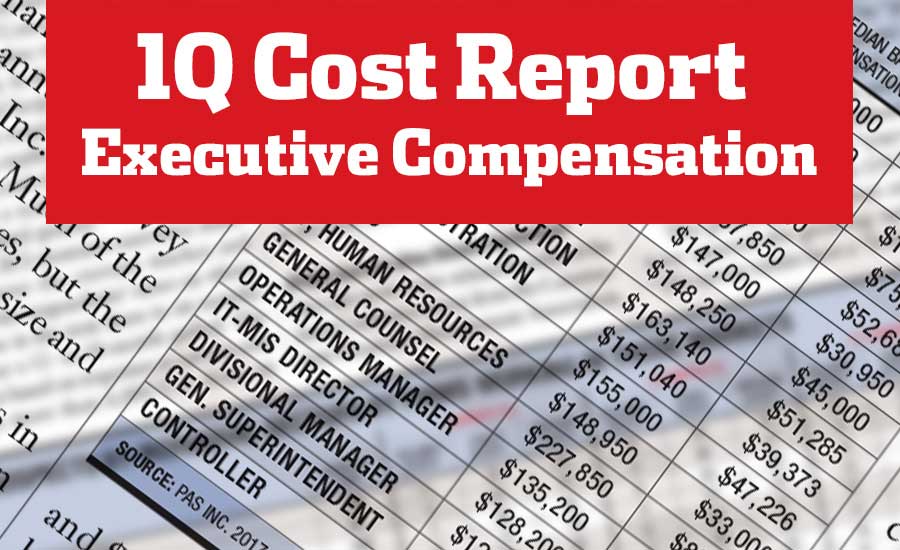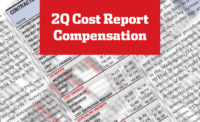With solid profits, U.S. contracting’s top managers are pocketing substantial bonuses on top of their base pay, say recruitment companies that conduct searches for top construction industry managers.
“The construction economy is very strong, volume is rising, and, as far as bonuses, it’s a good time to be a contractor,” says Dan Pauletich, senior managing director of Specialty Consultants, Pittsburgh.
The 3.7% average anticipated salary increase for 2017 is in line with what has been paid out in construction industry pay and executive compensation in recent years, according to the annual survey by Saline, Mich.-based PAS Inc. Its survey covers 17 different job titles. Much of the compensation is paid in bonuses, but the amounts vary by region, company size and job function.
|
|
For example, company presidents in New England that, in 2016, were paid an average base salary of $358,000 also received an average bonus of $268,000, PAS says. Companies in the Northwest paid their presidents an average base salary of $308,000, but the average bonus was $242,000.
Included in the PAS data are employees of general contractors, construction managers, design-builders and specialty contractors, including electrical and mechanical specialists. Some development firms that build also were surveyed.
Employers also bestowed bonuses on their vice president-chief financial officers, though more modestly than on their company presidents. If those people were employed by companies in California or New York, they probably collected more than their counterparts in other parts of the country. According to PAS, in 2016, vice president-chief financial officers in those states and surrounding areas earned average base salaries of $216,000 and $226,000, respectively, and average bonuses of $121,000 and $97,000.
Mark Jones, executive vice president of Kimmel & Associates, Ashville, N.C., warns about the hazards of comparing compensation without taking into account the market and service-delivery method. No matter what the position, coming up with a true average is difficult, says Jones. “It’s all relative to the amount of revenue a company is bringing in and if [it has] a VP of operations running 30 million units or 300 million units. The one with 300 million should be more highly compensated,” he says.
The nuances and variations also apply when it comes to the job of controller. According to PSA’s description, the controller provides direction for the entire range of financial activities of a smaller company or a major segment of the financial and accounting functions of a medium-sized to large firm.
The average base salary for a controller in 2016 ranged from $120,000 to $134,000 across the country, reports PAS. The median bonus amount ranged from $14,500 to $24,000.
Pauletich says he has done about a dozen controller searches in the past 12 months. Location, company size and duties all determine the differences. “The controller position in construction for a private-sector, medium-sized company with revenue of about $150 million is making $125,000 a year up to $150,000 to $160,000 in a big city like New York City, and the job usually includes accounts payable, receivables, general ledger work and work with an outside tax person,” he says.
Outside of big cities, Pauletich says, “a chief financial officer usually commands a base salary of $175,000 to $225,000, depending on the number of branch offices and revenue streams and how much responsibility in finance and investment that job includes. Some will also handle treasury, cash management, compliance and banking.”
In New York City, “you can’t get a CFO for under $200,000 in base salary,” notes Pauletich.
There are other kinds of compensation, according to PAS. More than half of the people with the CFO title enjoy the use of a company car. Extras, such as vehicle allowances and vacation days, sometimes can be negotiated by the selected job candidate, recruiters say.
Still, the bonuses make the biggest impression. While one recruiter talked of a vice president’s bonus that equaled 65% of the base pay, he also mentioned a vice president whose 2016 bonus totaled 2.5 times the base salary. “That was an outlier,” the recruiter said. Perhaps, but it tends to stay in mind.





Post a comment to this article
Report Abusive Comment